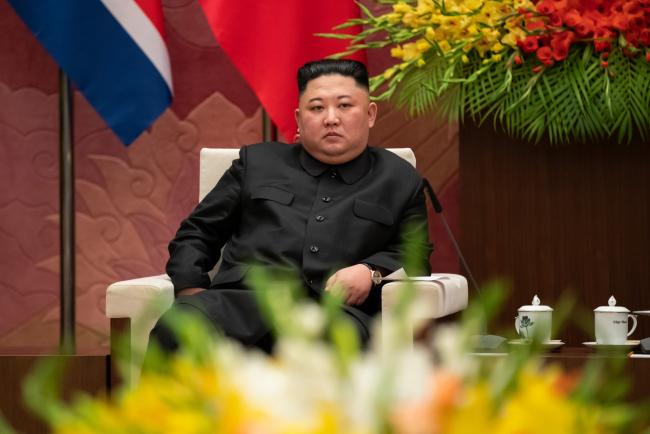(Bloomberg) -- President Donald Trump rejected calls for confidence-building economic projects with North Korea, in a blow to South Korean leader Moon Jae-in’s efforts to restart nuclear talks with Kim Jong Un.
The U.S. president, speaking Thursday during a White House meeting with Moon, said “this isn’t the right time” for inter-Korean projects including reopening a joint industrial park kept shuttered by sanctions. Still, he held out the possibility for other incremental steps that could keep negotiations alive.
“I’d have to see what the deal is,” Trump told reporters. “There are various smaller deals that maybe could happen. Things could happen. You can work out step-by-step pieces, but at this moment we’re talking about the big deal. The big deal is we have to get rid of the nuclear weapons.”
The remarks suggested the U.S. and North Korea haven’t narrowed differences that caused Trump to walk out of a Feb. 28 summit with Kim without securing a disarmament deal. Moon, who has staked much of his presidency in bringing the two sides together, had traveled to Washington to get negotiations back on track.
Trump said that “the door remains open to dialogue,” adding that a third summit with Kim “could happen.” The U.S. president asked Moon to reach out to Kim and determine his position, a senior South Korean official said.
“I believe this summit itself will be a huge help to sustain the momentum of dialogue between North Korea and the United States,” Moon said in a Facebook (NASDAQ:FB) post after the meeting with Trump.
Before heading to Washington, Moon’s government had pushed for a “good enough” or “early harvest” deal that could build momentum -- without elaborating on what such an agreement would involve. South Korea has been seeking the resumption of stalled inter-Korean economic projects such as joint factory park and mountain resort, which would provide the cash-strapped regime with a jolt of foreign currency.
On Wednesday, Kim asked top ruling party members to deal a “severe blow to hostile foreign forces” by resisting sanctions against the country, according to the official Korean Central News Agency. Last month, a top North Korean diplomat told reporters that Kim would decide “in a short period of time” whether to continue his freeze on bomb and missile tests.
Change in Pyongyang
North Korea is planning to celebrate the birth of its founder -- Kim’s grandfather Kim Il Sung -- on Monday, an occasion the regime has sometimes marked with shows of military might. The country held a meeting of its rubber-stamp parliament this week, an event that saw changes in the pecking order of its cadres and the elevation of one official who has been the target of U.S. sanctions.
North Korea replaced its nominal head of state, Kim Yong Nam, 91, with Choe Ryong Hae, a top figure in the military and ruling party. Choe was named Thursday to the role of president of the Presidium of the Supreme People’s Assembly, according to KCNA.
The promotion solidifies Choe’s status as Kim’s No. 2 official, giving him more authority to enforce Kim’s rule over the state’s most powerful bodies. He has led departments “that perpetrate the regime’s brutal state-sponsored censorship activities, human rights violations and abuses, and other abuses in order to suppress and control the population,” according to the U.S. Treasury’s Office of Foreign Assets Control said, which has targeted Choe with sanctions.
Even though there is no doubt about Kim Jong Un’s leadership, the reclusive state has used a figurehead for decades to carry routine functions such as receiving diplomats, with only the most important guests getting a meeting with the country’s real leader. Kim Il Sung was posthumously named the state’s eternal president.
Kim Jong Un was re-elected to his seat of power as the chairman of the State Affairs Commission, the country’s highest-decision making body, KCNA said.
